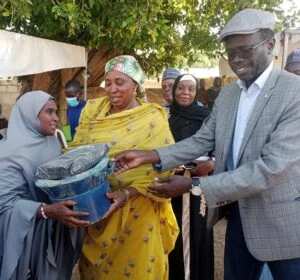FAO:24,500 Households Received Fuel-Efficient Stoves
The Food and Agriculture Organisation (FAO), launched and distributed Fuel-Efficient Stoves (FES) to 24,500 households in seven LGAs in Borno.
During the exercise at Mainari community of Jere LGA, the Head of FAO North-East office, Mr Al-Hassan Cisse, said it was part of FAO’s intervention to guarantee food security, nutrition, and ameliorate climate change impacts.
Cisse said the stoves were for 2023/2024 and a total of 123,506 households had benefited in Borno, Adamawa and Yobe states since the exercise started in 2018.
“To enhance the protection of women and children and the environment, FAO, through its Safe Access to Fuel and Energy (SAFE) Programme, is supporting the distribution of SAFE kits to affected households to reduce the associated risks.
“With funding support from Norway, Canada, Germany, Sweden, Japan, Switzerland, the ECHO, and the Central Emergency Response Fund, this programme was initiated in 2018.
“Since then, the items have reached about 123,508 households in the North-East region, excluding the 2023/2024 distribution we are launching today in Jere, Borno State.
“Our experience from the post-distribution evaluation of households that received FES in the past reported a 50 per cent reduction in firewood usage due to the stove’s high heat value, which cooks food faster than the local three-stone stove.
“The reduction in expenditure on fuelwood was 58 per cent, and the frequency of fuelwood scouting time was reduced from four times a week to 1.5 times a week, thus reducing the risk of exploitation of vulnerable groups,” Cisse said.
He noted that FAO had established some FES and Briquette production centres across Borno, Adamawa and Yobe states that continued to contribute to women’s economic empowerment, job creation and income generation.
An Energy Specialist with FAO, Dr Yakaka Maina, said some benefits of the stoves, apart from reducing deforestation and combating climate change, included improving respiratory health and enhanced social protection.
“It also conserved available resources, easy preparations of family meals, less indoor air pollution as well as create sustainable future,” she said.
Representatives of ministries of environment, women affairs and agriculture, lauded the interventions by FAO in various sectors which they said were keys to achieving some of the SDGs goals.
Bulama Mustafa and Bulama Daud, who spoke on behalf of the benefitting communities in Jere LGA, lauded the intervention, adding it would have a lasting positive impact on the communities resilience.
NAN/Oyenike Oyeniyi


Comments are closed.